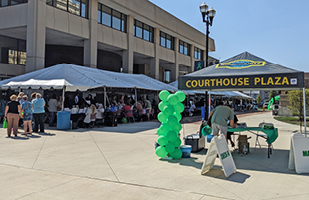Mental Health Focus in Miami County

The 3rd annual Mental Health and Community Resource Fair was held on the courthouse plaza in Troy, Miami County.

The 3rd annual Mental Health and Community Resource Fair was held on the courthouse plaza in Troy, Miami County.
The Miami County courts and community are coming together to address mental health, sharing the many resources available and how the local justice system is supporting people working toward recovery.
The third annual Mental Health and Community Resource Fair was held on the courthouse plaza in Troy earlier this month. This year’s event featured 70 organizations including 24 treatment facilities and the many agencies providing services for food, transportation, health issues, housing, and veterans, amongst the many other resources available. The fair also featured employers, live job interviews, and on-site driver’s license information. The resource fair was hosted by the Miami County Mental Health Court, organized by Judge Stacy Wall and staff.
Judge Wall started the Mental Health Resource Fair in 2022. It was a small idea that became a catalyst for a bigger event, she said. After the first year, it became the Mental Health and Community Resource Fair.
“The event is for everyone. Individually, you may not currently be in need of a resource, but we all know someone who is in need,” said Judge Wall. “There is an amazing amount of resources within our community but most people are unaware of the majority of services offered. One agency described it as ‘bringing partners together for our community.’”
Miami County is home to three certified specialized docket treatment courts, including two drug courts led by Miami County Common Pleas Court Judge Jeannine Pratt and Miami County Municipal Court Judge Anthony Kendell, and the mental health court led by Judge Wall. Not only do they intervene with individuals at high risk for future interaction with the criminal justice system by providing accountability and access to treatment services, but they also provide a rallying point for service providers to form partnerships that benefit the individuals in need in their communities.
Judge Wall says the Mental Health Court specialized docket has allowed participants to see the true meaning of the judicial system believing in rehabilitation by providing the needed support and resources they may have done without, often resulting in negative or criminal behaviors that put them before the court.
“They’ve recognized the value of the Mental Health Court as it teaches individuals not to ignore their mental health diagnosis but rather how to live with it in a healthy manner,” she said.
The true measure of success can be seen in the lives of those impacted.
One participant says what the court has done is so important “because when we fail, others tell us we are a failure. The court has shown us that we do matter.” Another said the Mental Health Court is working because it looks at the individual and his or her issues rather than treating everyone the same.
“To see the participants flourish has been truly rewarding,” said Judge Wall.
Supreme Court staff with the Specialized Docket Section attended the event to talk with the judges and attendees, helping to inform their work with other courts across the state that are interested in engaging their communities and growing support for specialized dockets.
“It was truly inspiring to see Judge Wall’s willingness to bring so many service providers and community resources together for one collaborative event,” said Sara Smith, policy counsel for specialized dockets at the Supreme Court.
“We are providing the opportunity for the community to learn about its depth of resources while at the same time fighting the stigma of mental health. What better way to do that than on the courthouse plaza,” said Judge Wall.


